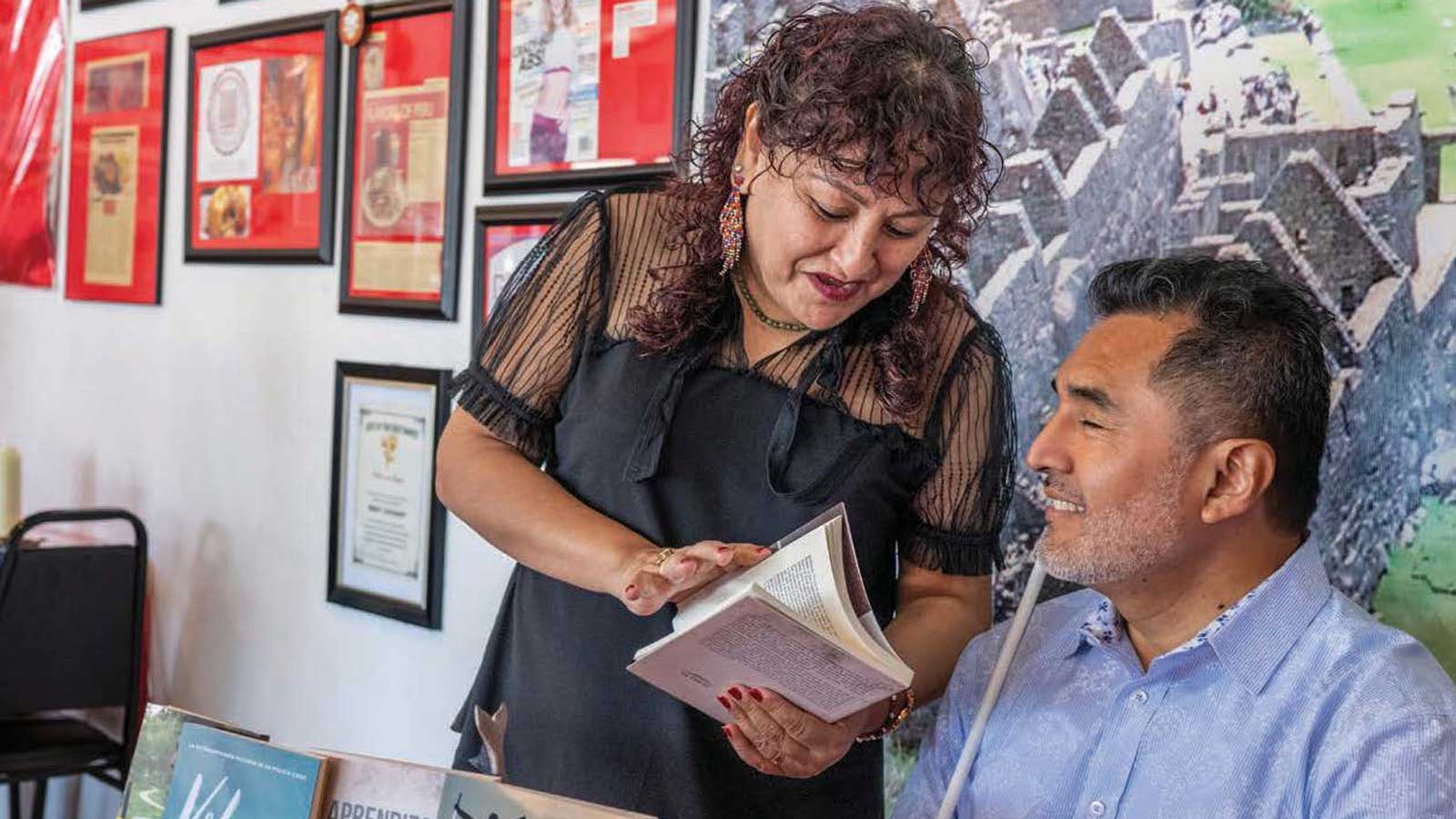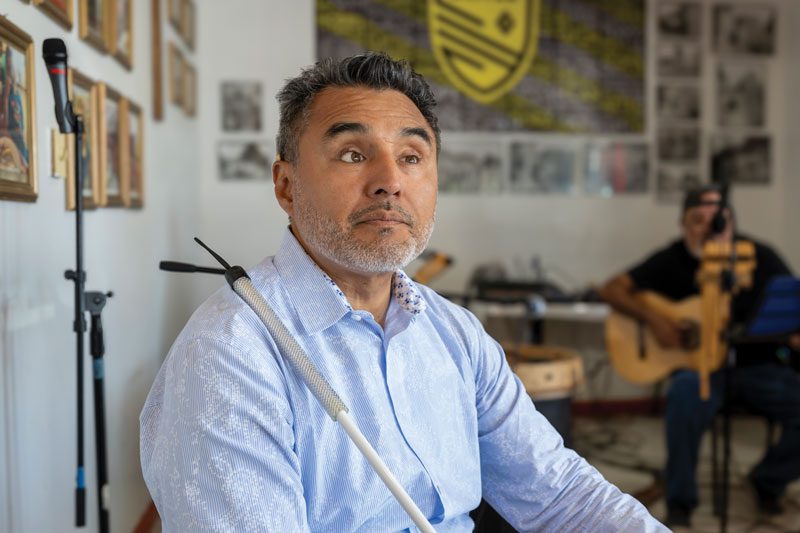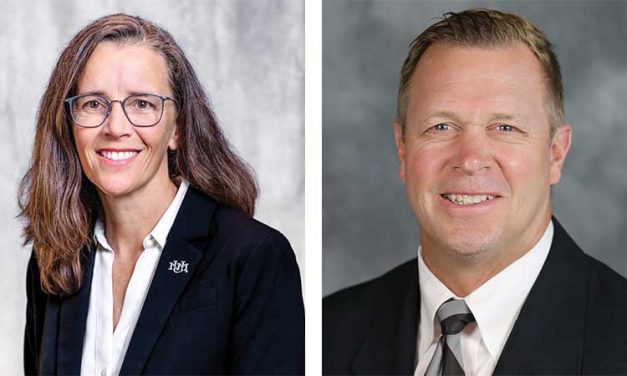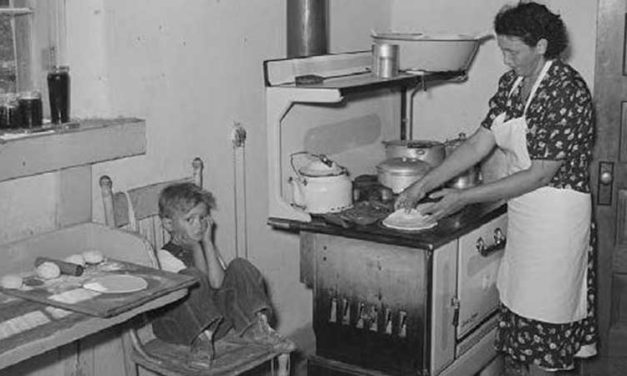
“Just Part of My Life”
Story by Leslie Linthicum Photos by Roberto E. Rosales
In his memoir, “Running Dreams,” Servan recalls the moment on that patrol that his old life — young and on a path to a career in police work in his native Peru — abruptly ended and the long and difficult journey began to a new life he never would have imagined.
“My right boot brushed up against something. The object, about the size of my fist, felt different somehow, lighter than I would have thought for a rock. I picked it up. Its mud- encrusted, rusty surface looked as if it had been shot through by bullets. Suddenly, it exploded in my right hand.”
In the hospital, his head bandaged and on strong pain killers, Servan waited to be told the extent of his injuries. Every night he inched his aching left hand a little closer to his right until he finally could reach across his body and realize his worst fear. His right hand was gone.
Today, at 57, Servan remembers a moment he had as a 20-year-old, on vacation from the detective training academy. He was poolside, taking in the beautiful flowers and the beautiful girls.
“I’m thinking, ‘So OK, I’m getting ready to become a detective. I might be exposed to fighting and I might lose my legs. I could be okay. And then I could maybe lose my arms. I would be OK. And then I could become deaf. I’ll be fine; I can still do everything else. And then I thought, what if I become blind?’ And I didn’t want to think about it. No, no, that would be too bad. I don’t want to think about it.”
When the bandages came off his face, Servan was blind. He had lost his right eye, and surgery to restore the vision in his left eye was unsuccessful.
Servan is on the phone from Burlington, Vt., where he is attending a conference on the importance of data in vocational rehabilitation.
As the executive director of the Nebraska Commission for the Blind and Visually Impaired, Servan travels frequently.
He wonders whether his poolside ruminations about blindness were a foreshadowing of his destiny or just the idle thoughts of a young man about to embark on a life of adventure. But he realizes he was right about one thing — blindness has been harder to overcome than losing a hand.
“The misconceptions about blindness, the awkward way people would treat me even though I was the same person, that was the hardest to overcome, especially at the beginning,” Servan says.
His career in policing came to an end, as did the hobby he was passionate about — running. His girlfriend left him. It was a depressing time, especially for a young man who was intent on finding a rewarding career.
“There’s this idea that there’s a lane for blind people to stay in and the sort of jobs would be expected,” Servan says. Helpful and well-meaning people suggested massage therapy, telephone operator, musician.
“In the back of my mind, I knew I could do something, you know?”
Servan’s father died of a heart attack while he was away at training. But as his son was growing up, he offered what would become prescient advice. “It is not the circumstances of birth that make a man; it is what he makes of himself. You will have ups and downs, but your strength of character will show as you get up after every fall.”

Carlos Servan earned three degrees from UNM after losing his sight.
In Peru, Servan had learned the basics of the Braille code and how to walk with a cane. As he was living in Baltimore with his mother along to help him, Servan began to take English as a Second Language classes and found a sponsor for his application to immigration services to stay in the United States.
Because Spanish was his first language, Servan was sent to New Mexico to continue his training. In Alamogordo, Servan was immersed in learning how to live independently without sight.
“The skills of blindness have to do with learning and embracing the Braille system and learning how to get around in all situations with the white cane,” Servan says. Doing your own shopping, cooking, using the stove. Not just the basics, but mastering them.”
After he finished the course at Alamogordo, Servan moved to Albuquerque and continued to learn English. When he thought he was ready, he applied to UNM.
“It was a big challenge,” Servan says, learning how to navigate the campus, find his classrooms and get his reading materials on tape. He learned to type his papers with one hand.
“I guess I got good training in Alamogordo, because once I knew where my classes were, it was easy,” Servan says. He likes navigating in crowded spaces. “When there are a lot of people in a place, it’s easier for a blind person because if you get
confused, you can ask anybody. And you can listen to the footsteps, where people are going, when people turn to the left or to the right. You can hear when people go upstairs.”
Servan got his BA in political science in 1993 and for a second time was accepted into law school. At UNM he studied law while also pursuing a master’s degree in public administration. With an MPA in 1995 and JD in 1997, Servan was ready to work in the field he had come to know and respect — services for the blind.
He was hired as the deputy director of the Nebraska Commission for the Blind and Visually Impaired and in 2017 became the agency’s executive director. Like the New Mexico Commission for the Blind, which helped Servan get his footing when he first landed in Albuquerque, the Nebraska commission offers independent living and vocational rehabilitation to help blind people, like Servan did, pursue their chosen career fields.
Servan has always advocated for full immersion of the blind in life. too. “You know, when I talk to people here, they usually just want to settle for jobs or benefits that will only take care of them. I say, ‘You can do more.
You can own your own house, you can go on vacation, you can have money for your retirement. And not only that, but you just feel productive.’”
Servan has also seen a change in younger blind people, especially those who have come of age since the adoption of the Americans with Disabilities Act.
“So the blind folks in my generation, we never thought the world would change for us. We thought we have to do everything for ourselves,” Servan says. “But after the ADA, the new generation, they say, ‘Wait a minute, I have the right. You better make this accessible.’
They’re more assertive and that’s good.”
Greg Trapp (’87 BA, ’90 JD) met Servan in the late 1980s on a bus trip to a National Federation of the Blind conference in Denver. Trapp was finishing law school, Servan was thinking of applying and, even though Servan still struggled with English, the two hit it off.
“Kind of kindred souls, kindred travelers,” says Trapp, who is executive director of the New Mexico Commission for the Blind.
“The skills of blindness have to do with learning and embracing the Braille system and learning how to get around in all situations with the white cane.”
They remained friends and colleagues and Trapp has been impressed by Servan’s fortitude. “He was able to overcome both the blindness and the physical disability and also the language barrier,” he says. “He really is a leader in our field and he has accomplished a tremendous amount in his life and a lot of blind people have benefited from his work.”
They spend time together regularly as they travel to conventions — Trapp was president of the National Council of State Agencies of the Blind in 2007 and Servan just finished his term as president — and before Trapp was married, he liked to take advantage of Servan’s charisma and Latin accent to meet women.
“We would go to the hotel bar and I would say, ‘Carlos, start talking.’”
Servan began his latest vocation — author — only as a way for him to review the astounding events of his life. As he wrote he began to think he might have a story that could help or inspire others and he eventually found a publisher who brought the memoir to bookstores. Of course, it’s on Audible as well.
As to the ending of Servan’s story, it is not yet in its final chapter. He has exciting innovations in the works in Nebraska, including developing equipment that will help high school and college students do laboratory science independently and using
a 3D printer so blind people can name something they would like to experience — say the artery system of the heart — and have it quickly in their hands.
He ended up marrying Catalina, the woman he began dating after his injury. They have four children — all graduated from college and several in graduate school. His mother settled in Albuquerque and his siblings live there today.
As for running, Servan still does. He takes to a bike path in Lincoln with a partner, one of his children or a colleague, holding one end of his cane and running a step or two ahead of him.
Also, Servan jokes, he walks so fast with his cane that maybe running isn’t even necessary.
“Blindness, it’s just part of my life,” Servan says. “Obviously I have challenges, but we all do in parts of our life.”
Spring 2024 Mirage Magazine Features
Understanding Headwaters
Understanding HeadwatersJan 7, 2025 | Campus Connections, Spring 2024 A $2.5 million grant from...
Read MoreNo Je or No Sé?
No Je or No Sé?Jan 7, 2025 | Campus Connections, Spring 2024 In his research, Associate Professor...
Read More‘A New Pair of Eyeglasses’
‘A New Pair of Eyeglasses’Jan 7, 2025 | Campus Connections, Spring 2024 Nancy López,...
Read MoreSenate Judiciary and Mental Health
Senate Judiciary and Mental HealthJan 7, 2025 | Campus Connections, Spring 2024 Colin Sleeper, a...
Read MorePlant Power
Plant PowerJan 7, 2025 | Campus Connections, Spring 2024 More people are choosing plant-based...
Read More






